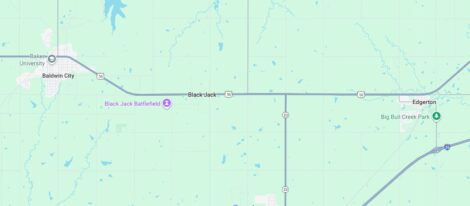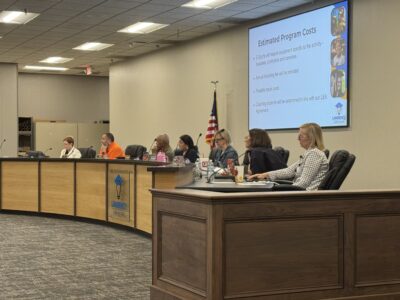Douglas County leaders consider slashing KU Innovation Park funding, citing long-term tenants and lack of tax revenue

photo by: Josie Heimsoth/Journal-World
Douglas County commissioners met on Wednesday, April 2, 2025.
Douglas County commissioners plan to potentially cut at least one-third of their funding to a University of Kansas center for startup companies, arguing that some businesses have stayed many years and aren’t paying taxes.
At deliberations for the 2026 budget on Monday, county commissioners expressed a desire in cutting funding to KU’s Innovation Park, which houses laboratories and office space for startups, emerging technology businesses and collaborations involving KU researchers and large technology firms.
In the county’s 2026 budget, $175,000 was allocated toward the organization to support early-stage companies in overcoming the challenges of launching. However, after meeting last week with Adam Courtney, CEO of KU Innovation Park, county commissioners expressed concerns about the several businesses that have remained in the facility for over a decade, despite the facility’s purpose to help new companies get their feet on the ground.
While no final decisions on the 2026 budget were made on Monday, commissioners are considering cutting funds to KU Innovation Park by $60,000 for 2026. Looking ahead, the County Commission expressed an interest in exploring the idea of requiring long-term tenants at KU Innovation Park to begin paying taxes.
Commissioner Shannon Reid opened discussions about the organization on Monday, saying she initially contemplated cutting them completely from the budget for 2026, but instead proposed cutting $100,000 of their funding.
“I don’t think that we need to subsidize their budget as much as we have historically based on how much their budget has grown in all their areas,” Reid said. “It feels a little like we’re subsidizing university activity and private business activity without having a clear understanding on the return on investment.”
Commissioner Patrick Kelly also said – while not suggesting as big of a cut as Reid – he wanted to reduce the organization’s funding.
“I think this is year three for asking for a plan in payment in lieu of taxes,” Kelly said. “We have businesses that have been there for over a decade. I’m struggling to understand how we need to continue funding that because the hope is that businesses spin out of it. That seems to not be the trend now.”
Commissioner Karen Willey supported providing the full $175,000 already in the budget, saying KU Innovation Park is a big driver in diversifying the economy in the community.
“I think that whatever funding level we come to, and again, I’m OK with the full funding, I think we tie that to a fully fledged plan for a payment in lieu of taxes program or companies graduating onto a tax rolls plan.”
Additional funding requests from:
• The Douglas County Sheriff’s Office, which has requested $164,255 in funding for two additional network administrator positions for its IT division. County Administrator Sarah Plinsky previously told commissioners that this has been a request from the Sheriff’s Office for a number of years.
Several commissioners are considering funding one of the two positions to address not only the growing needs for these positions, especially considering the ongoing expansion to the Judicial and Law Enforcement Center as well as the construction of a new Public Safety Building. Meanwhile, the county’s IT department also has a few requests of its own for additional IT positions.
“I think that there is sort of a larger conversation for us to unpack or understand as commissioners about the whole picture of IT operations countywide,” Reid said.
• The county’s department for Housing and Human Services, which is seeking $100,000 for a communitywide child care scholarship fund, a goal outlined in the anti-poverty focus area of the Community Health Improvement Plan. The fund would provide financial assistance to help low- or moderate-income families with children under 6 years of age and parents in the labor force afford childcare.
Some commissioners suggested putting funding for the initiative in the contingency budget, as the commission wants to learn more about the roles of local partners in the project moving forward. Commissioner Gene Dorsey said he thinks there needs to be some kind of funding in this area because the demand for child care is “through the roof.”
“If you’re trying to develop economically, you need a place to work, a place to live and a place to drop your kids off,” Dorsey said. “So I’m supportive of the concept. I’m not hung up on the specific dollar amount, but I do think we need some assistance in this area.”
• The Douglas County Historical Society, which is requesting $19,685 to support “Finding Freedom: The Promise of 1776 in Douglas County, Kansas,” a joint exhibition by the Douglas County Heritage Partners. Each of the partners — the Douglas County, Clinton Lake, Eudora Area, Lecompton and Santa Fe Trail historical societies — will host a unique chapter of the exhibit, with brochures and panels encouraging visits to all five sites.
The exhibition explores the struggle to fulfill the Declaration of Independence’s promises of equality and civil rights on the American frontier. All commissioners agreed that funding toward the exhibition should be included in the budget for 2026.
What’s next?
Douglas County staff are proposing a $191.4 million budget for 2026 that holds the property tax rate flat at 41.298 mills. One mill is equal to one dollar per $1,000 of a property’s assessed value. A homeowner with a $600,000 home would pay $2,850 in property taxes to the county with the proposed rate. Meanwhile, a $300,000 property would have a bill of $1,425, and a $200,000 home would incur $950 in taxes.
However, the tax a property owner pays is not just determined by the mill levy; it’s also based on the property’s assessed value. Even if tax rates stay the same or are lowered, rising property values may still cause tax bills to increase for many residents. The total assessed property valuation in Douglas County increased 5.7% in 2025, compared to 6.8% in the previous year.
County commissioners will continue budget deliberations on Tuesday from 9 a.m. to noon. If needed, another day of deliberations has been set aside for 9 a.m. on Wednesday.
The public is welcome to attend in person or join virtually on Zoom, and there is no opportunity for public comments during the deliberations. The details from the meeting and recordings will be available on the county’s YouTube page.
Additional hearings are also scheduled for the five-year Capital Improvement Plan and Douglas County Consolidated Fire District No. 1, which will take place on Wednesday, Aug. 6, at 4 p.m.
Currently, the County Commission is expected to adopt the 2026 budget during a public hearing at its business meeting on Wednesday, Aug. 27. People can read the entirety of the proposed budget for 2026 on Douglas County’s Budget and Finance webpage.







